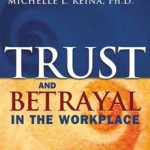Building Trust in Your Organization – Interview with Dennis & Michelle Reina.
I am excited to welcome Dennis S. Reina and Michelle L. Reina, principals of The Reina Trust Building Institute, who specialize in the development of trust in the workplace. Based on this work, they have developed a model that defines the three types of trust and illustrates factors that contribute to the development of trust in workplace relationships. They are coauthors of Trust and Betrayal in the Workplace and our featured guests this week.
Dennis & Michelle, what is the question you were trying to answer in writing this book?
Business is based on relationships and trust is the foundation of effective relationships. Trust is essential for effective business relationships. Many people talk about the importance of trust, they often speak to the value of it; corporations have trust or some related simile in their mission, value or principles statements. Yet, there is only one way that trust is built or broken–that is by behavior–at the individual, team and organizational levels.
Through pioneering research and practice with clients across North America and other parts of globe for the last 20 years, this book defines the behaviors that build trust, break trust and the steps to rebuild and transform the capacity for trust in workplace relationships at all levels of the organization.
Your title talks about betrayal. Where does that play out in your work with organizations?
There are many challenges to building and maintaining trust in the workplace: Trust is highly complex, emotionally provocative–both in the positive and negative sense and it means different things to different people.
From years of studying the dynamics of trust, we have found that trust and betrayal are natural elements (behaviors) of the human condition (in interpersonal relationships). Trust is built and trust is broken everyday on the job. Betrayal plays out at all levels of the organization–from the blatant to the subtle–the most prevalent in the workplace are the subtle, minor ways that trust is broken.
What are the different ways to betray your coworkers and stakeholders?
First, let us start with what we mean by betrayal. We define betrayal on a continuum from major to minor, intentional and unintentional. While major betrayal decisively breaks trust, most often it is the minor unintentional ways that trust is eroded over time that breaks trust in the workplace–each and every day. Behaviors such as gossip, not showing up to meetings on time, not delivering as promised, shunning, work-arounds, leaving people out of communication that should have been a part of, etc. are examples of minor betrayals. Minor betrayals accumulate over time and become major. Our research shows that 90% of employees experience these types of betrayal frequently.
The net result of these minor betrayals is major–people mentally and emotionally check-out. They may wait it out until the economy improves and walk out the door and the organization loses years of corporate intelligence and experience and its good employees. Or worse yet, they may stay–becoming the “working wounded”–doing as little as they can to get away with–no more, no less.
Trust is often brought up as one of the core competencies that leaders must demonstrate. What is unique about your approach that helps leaders become trustworthy? (Read more tomorrow!)
Check out CO2 Partners – Leadership Assessment!



